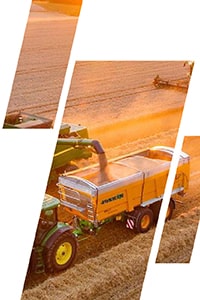Finalising your subscription
To validate your subscription, please enter the 6-digit code that we have just sent you by e-mail.
As an option, it is possible to equip your vehicle with a load transfer system. In this case, a hydraulic ram is connected to the 3rd point of the tractor, as well as to a 3-point device on the machine. This hydraulic ram, together with a hydropneumatic drawbar suspension, is operated from the tractor cab. When activated, the ram rod pushes the tractor third point forward, increasing the load on the front axle. This gives the tractor more grip. The effect is somewhat comparable to that created by a front counterweight. This grip system is especially useful in difficult terrain conditions.
An inner partition bolted at the front of the tank (first third) allows to keep as much weight as possible on the tractor hitch when spreading (e.g. vacuum tanker). This improves grip and traction. When filling, the volumes on both sides of the partition are simultaneously punt under vacuum for a complete filling. When emptying, the volume at the back of the partition is put under pressure first in order to keep the front part filled. When the slurry level reaches the lower edge of the partition, an air in-draft is created towards the front part in order to empty it progressively. This weight transfer system is particularly useful on trailers equipped with a wide, heavy rear implement, such as spreading booms of over 18 m. It indeed partially compensates for the load transfer from the tractor eye to the rear when the boom is unfolded, or keeps the weight on the eyelet as long as possible when spreading uphill.
As standard on most vehicles with a Hydro-Tridem or Hydro-Pendul Tridem running gear, the front lifting axle can be an interesting option when driving on the road with an empty vehicle: less friction, and therefore less energy consumption and tyre wear. On double or triple-axle muck spreaders, the use of the first lifting axle when spreading automatically transfers more weight to the rear axle of the tractor, giving it more support and therefore a better traction. This option is operated from the in-cab control box.